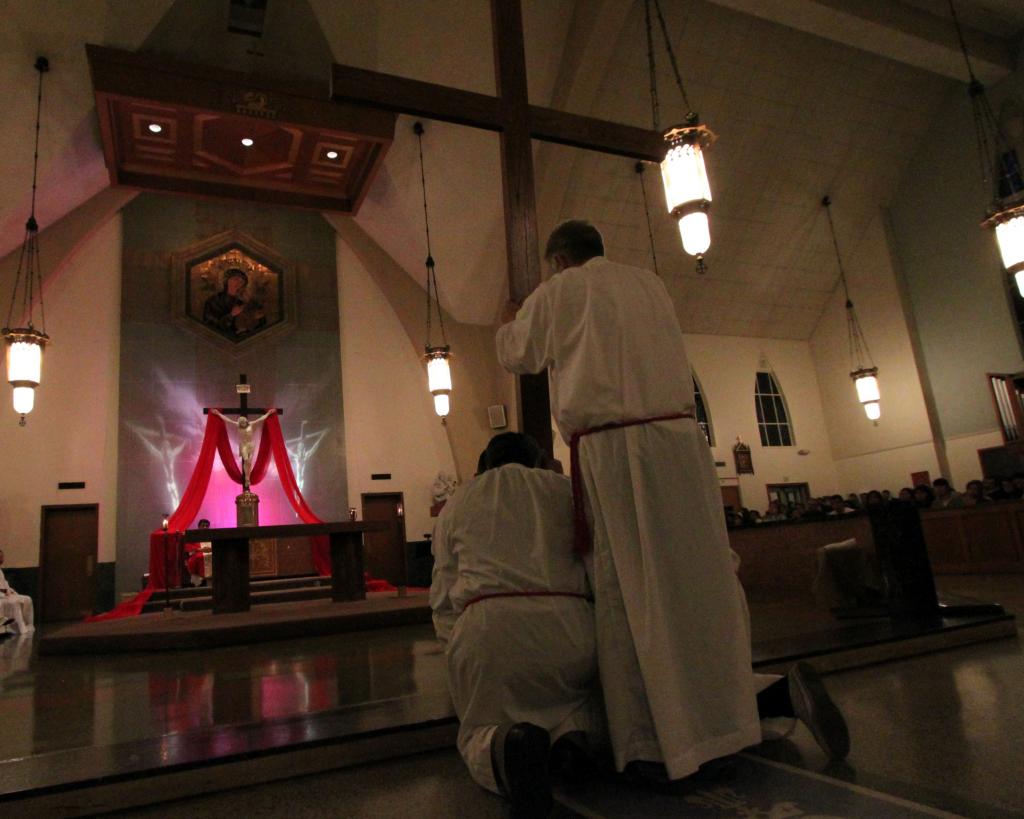
From a non-Catholic Christian perspective, anything to do with giving honor or veneration to the Virgin Mary or saints can be quite intimidating. The first thing that usually comes to mind is the first of the Ten Commandments,
“I am the Lord your God, who brought you out of the land of Egypt, out of the house of bondage. You shall have no other gods before. You shall not make for yourself a graven image, or any likeness of anything that is in heaven above, or that is in the earth beneath, or that is in the water under the earth; you shall not bow down to them or serve them; for I the Lord your God am a jealous God, visiting the iniquity of the fathers upon the children to the third and the fourth generation of those who hate me, but showing steadfast love to thousands of those who love me and keep my commandments.” — Exodus 20:2-6 RSV
The Catholic Church also respects these Commandments when it comes to worship that is meant for God alone. Though the topic of how objects become idols is discussed in my article ‘Do Catholics Worship Idols,’ one of the things that is often rarely talked about in Protestant circles is whether mere honor or veneration is equal to full-on worship. This is where there is a bit of a language barrier because Protestants (namely North American Evangelicals) generally use more simplistic language than Catholics do in describing theological terms. This is also one of the reasons why I find Evangelicals have earned their title because they tend to be far more effective at evangelism than Catholics are.
One of the main reasons why Protestants are often repelled at the idea of venerating the saints is because, in modern English, the word ‘veneration‘ is often attributed to the word ‘worship.’ The definition of worship has been historically used as a way to attest to someone’s worth or significance, and anyone who has particular significance is usually paid a level of due honor or respect. This is one of the reasons why people, especially in positions of authority or political significance, are sometimes addressed as ‘your worship,‘ which is another way of saying phrases like your honor, your eminence or your highness. Nowadays, the Euro-American Protestant understanding of the word worship has been restricted from any honor due to a human except the kind of honor given to God alone.
There are a number of passages to consider when discussing the meaning of worship. To start, Exodus 20:12 (RSV) says, “Honor your father and your mother, that your days may be long in the land which the Lord your God gives you.” I think it comes without saying that, as Christians, we certainly do not worship our parents. But if we took that same type of logic and applied it to the fourth Commandment, one could say that honoring one’s parents is a form of worship. Chances are, the vast majority of Christians would not equate honoring our parents with making them out to be some sort of god and goddess. But in a sense, we do venerate them to a degree higher than we would to those we have no blood-relations with.
The second observation from Scripture would be that the student is not greater than the teacher (Matthew 10:24, Luke 6:40). When we read about saints and prominent figures in the Bible, we read and meditate over how their lives gave glory to God. While they may not be alive on earth, the saints and biblical figures are, in a sense, ‘teachers’ of the faith to us. Some Protestants have been known to keep books or recordings of a particular pastor or teacher who may have passed away long ago, but the effectiveness of their preaching style and biblical citation lives beyond their earthly lives through the legacy they left behind. This is no different than how Catholics treat the prayers and literary works of the saints.
The third being that Jesus commands to give to Caesar what is Caesar’s and to God what is God’s (Matthew 22:21, Mark 12:17). While Roman Emperors are far from being considered canonized saints, it’s worth pointing out that the respect for personal property and recognizing governing authorities (Romans 13:1) is a value taught by Christ. When we show honor or respect, we are not worshipping the person to which respect is due. We are simply giving glory to God by obeying His Word. Of course, obedience has its limitations until people or worldly authorities push you to go against your values and principles,
The Bible is filled with examples of giving specific honor to people. In the passage where an elderly Isaac gives Jacob a blessing, he recites,
“May God give you of the dew of heaven,
and of the fatness of the earth,
and plenty of grain and wine.
Let peoples serve you,
and nations bow down to you.
Be lord over your brothers,
and may your mother’s sons bow down to you.
Cursed be every one who curses you,
and blessed be every one who blesses you!”
— Genesis 27:28-29 RSV
Though this event would have taken place prior to the Law of Moses, there is an implication that there are certain contexts when bowing down does not equal adoration, as for what Exodus 20:2-6 refers to regarding idolatry. Jacob and Esau certainly did not worship their father Isaac as though he were God, nor was Isaac implying that their ancestors would worship them. But the act of honoring the dignity and significance of their patriarch is evident. Similarly, Jesus Himself would have had to kneel down while washing the feet of His disciples (John 13:1-17). If we as Christians are called to imitate Our Lord, sometimes it involves bending a knee — not in adoration, but in an act of service.
This is why the Catholic Church categorizes types of worship such as adoration apart from veneration and earthly honor. As defined by Saint Augustine in his theological work City of God, the distinctions between adoration and veneration are defined as Latria, Dulia and Hyperdulia. Latria being supreme honor and adoration of the Trinity (Father, Son, and Holy Spirit), Dulia being the honor that’s due to the saints, and Hyperdulia which is special honor given to Mary as the Mother of Our Lord and Queen of Heaven.
As far as these terms are concerned, I find it easy to think about them as ‘degrees’ of worship. But on the contrary, Catholic theologians insist that the difference between them are as far apart as what separates Creator from the created. We give honor and veneration to the saints who are created beings, but we adore the Creator.
Regarding the Virgin Mary, Protestants tend to subconsciously categorize her with the saints and living people on earth on the same plane. This is largely because how they interpret such passages like Romans 3:10,23 seemingly implies that Mary would have been a sinner like every other human being — hence why they do not accept the Catholic dogma of the Immaculate Conception as biblical. I think they are well meaning in doing so because every Christian who is well-versed in their Bible takes the Lord’s Commandments seriously. No Christian wants to risk placing a created being at an equal level (or higher than) God Himself.
An interesting observation I’ve noticed is that Protestants actually perform acts of Dulia whether they realize it or not — that is, without praying for the intercession of the person they are honoring. They certainly give honor and recognition to prominent pastors and historical Christian figures such as Martin Luther, John Calvin, John Wycliffe, William Tyndale, John Wesley, Charles Spurgeon, Billy Graham and others for the examples of what they consider to be leading Christlike lives and preaching a biblical message. But much like the saints venerated by Catholics, these people are also mere humans whom I’m convinced would unanimously agree to direct all glory to God and less towards themselves.
When considering the differences between what type of reverence or worship is given to either God or humans, it all boils down to whether God is perfect in humility. I don’t imagine a completely narcissistic deity would command his creations to honor their mother and father, or even give any form of respect to an earthly authority. This is why, as I’ve discussed further in my article A Contemplation Of Soli Deo Gloria (Glory To God Alone), I’ve come to believe that God desires His creations to share in His glory, not remain outside of it. The point of venerating a saint is not to pretend they were impeccable or diminish the role of Christ as Messiah, but to honor how God’s infinite grace has worked through their finite abilities.
















